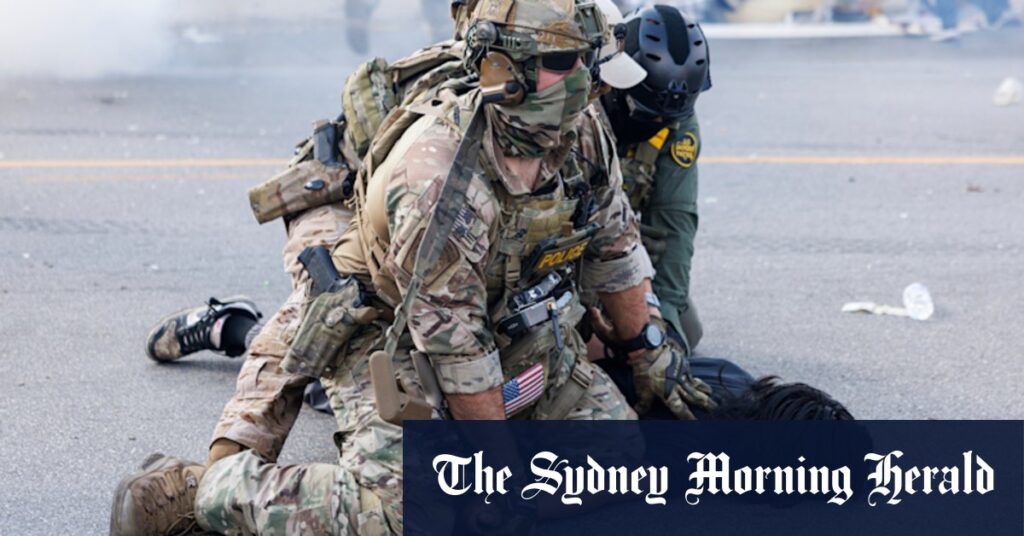
US President Donald Trump authorized the deployment of 300 Illinois National Guard troops to protect federal officers and assets amid ongoing protests in Chicago on Saturday, marking the latest escalation of his use of federal intervention in cities. This decision has sparked significant controversy and legal challenges, highlighting a growing conflict between federal and state authorities over the handling of civil unrest.
On the same day, a similar mobilization of 200 National Guard troops in Oregon was temporarily blocked after a federal judge found Trump was likely overstepping his legal authority in responding to relatively small protests near a US Immigration and Customs Enforcement building in Portland. The ruling underscores the tension between federal and state powers, particularly in Democratic-led states.
Federal Intervention and Local Resistance
White House spokeswoman Abigail Jackson confirmed the president had authorized the use of the Illinois National Guard members, citing what she called “ongoing violent riots and lawlessness” that local leaders have not quelled. The Department of Homeland Security also acknowledged that federal agents had shot a woman on Saturday morning on the southwest side of Chicago, further inflaming tensions.
The woman, Marimar Martinez, was allegedly driving one of the vehicles involved in an ambush on federal agents and was reportedly armed with a semi-automatic weapon. She was taken to the hospital and later discharged into the custody of the FBI. The driver of another vehicle, Anthony Ian Santos Ruiz, was also apprehended by law enforcement, according to DHS.
Trump has characterized both Portland and Chicago as cities rife with crime and unrest, calling the former a “war zone” and suggesting that apocalyptic force was needed to quell problems in the latter. Since the start of his second term, he has sent or spoken about sending troops to 10 cities, including Baltimore, Maryland; Memphis, Tennessee; the District of Columbia; New Orleans, Louisiana; and the Californian cities of Oakland, San Francisco, and Los Angeles.
Governors Push Back
The governors of Illinois and Oregon have expressed strong opposition to these deployments. Illinois Governor J. B. Pritzker stated, “This morning, the Trump administration’s Department of War gave me an ultimatum: call up your troops, or we will. It is absolutely outrageous and un-American to demand a governor send military troops within our own borders and against our will.”
The deployment to Chicago follows frequent rallies near an immigration facility outside the city, with federal officials reporting the arrests of 13 protesters on Friday near an ICE processing facility in Broadview. The presence of armed, camouflaged, and masked Border Patrol agents making arrests near famous Chicago landmarks has amplified concerns about racial profiling, especially in immigrant-heavy and largely Latino areas.
Federal Attorney-General Pam Bondi has issued a memo directing component agencies within the Justice Department, including the FBI, to help protect ICE facilities, including in Chicago and Portland.
Legal and Social Ramifications
In Oregon, Trump’s characterization of Portland as “war-ravaged” has been met with skepticism by local officials, who argue that many of his claims rely on outdated images from 2020, when demonstrations and unrest followed the killing of George Floyd by Minneapolis police. Oregon Governor Tina Kotek spoke to Trump in late September, stating the deployment was unnecessary and refusing to call up any Oregon National Guard troops. Trump’s unilateral decision prompted a lawsuit from city and state officials.
US District Court Judge Karin J. Immergut issued a ruling temporarily blocking the Portland deployment, stating that the relatively small protests did not justify the use of federalized forces and that allowing the deployment could harm Oregon’s state sovereignty.
“This country has a long-standing and foundational tradition of resistance to government overreach, especially in the form of military intrusion into civil affairs,” Immergut wrote. “This historical tradition boils down to a simple proposition: this is a nation of constitutional law, not martial law.”
Before the judge’s ruling, about 400 protesters had marched to the Portland ICE detention facility. Federal agents used chemical crowd-control munitions, including tear gas canisters and less-lethal guns that sprayed pepper balls, arresting at least six people as the group reached the ICE facility.
Broader Implications and Future Actions
Trump’s deployment of federal troops to other cities, including Memphis, Tennessee, and New Orleans, Louisiana, has been met with mixed reactions. In these Republican states, the deployments have been welcomed by the relevant state governors. However, in California, Democratic Governor Gavin Newsom successfully sued to block the deployment of guard soldiers and active-duty marines in Los Angeles, with a federal judge finding the president’s actions likely unlawful.
The ongoing clashes between federal and state authorities over troop deployments highlight a broader national debate on the balance of power and the appropriate response to civil unrest. As legal battles continue, the implications for federal-state relations and the protection of civil liberties remain uncertain.
Looking ahead, the outcomes of these legal challenges could set important precedents for the limits of federal intervention in state affairs, particularly in times of civil unrest. As the situation develops, both sides are likely to continue their efforts to assert control over the narrative and the legal landscape.







